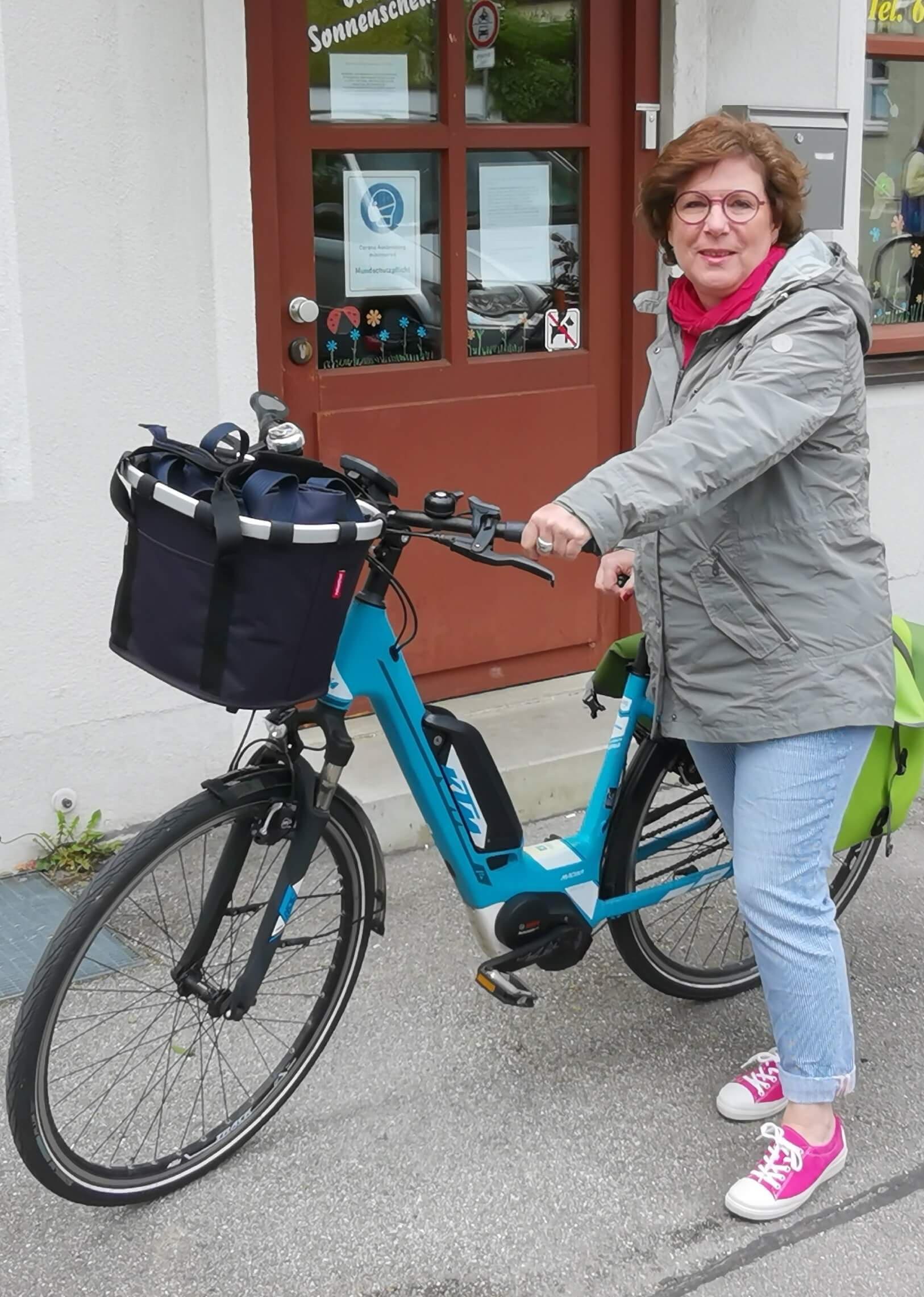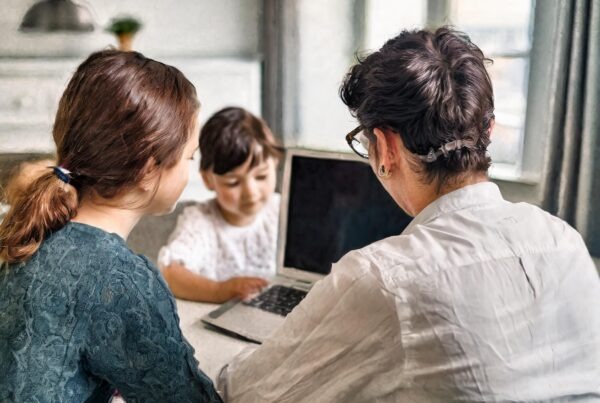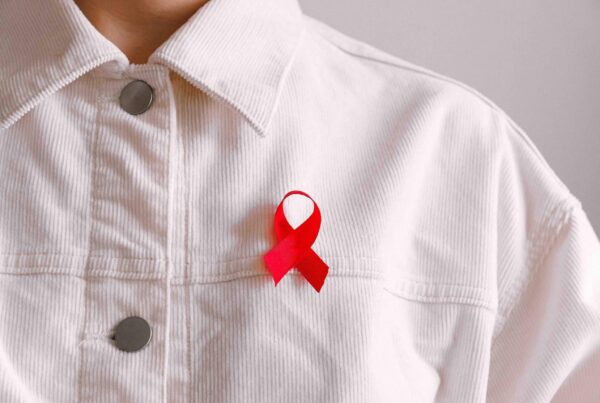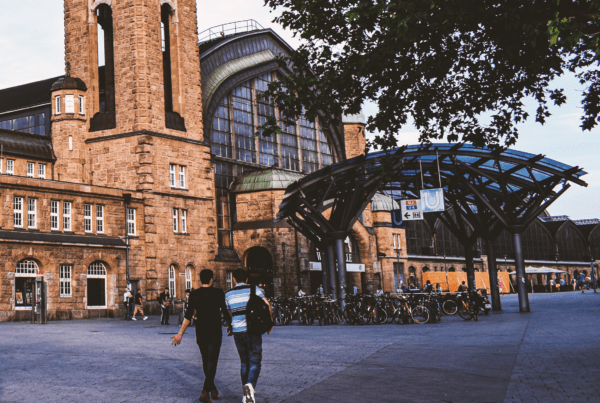The Neighbourhood Assistance in Au – an important pillar for social peace in the Munich district of Au. But the future of the association is uncertain.

Rain is pelting the asphalt incessantly on this cold day in May. The traffic rushes through Gebsattelstraße, which connects the upper and lower Au with a steep gradient. On the other hand, on the ground floor of house no. 2, an inconspicuous functional building with a beige paint job that is no longer quite fresh, there are quite different worries. Here, Renate Schnückel is in her element to alleviate distress. As every Wednesday (except during school holidays), the head of the “Nachbarschaftshilfe in der Au e. V. ” (= Neighbourhood Assistance in Au) is offering an open consultation hour today from 2 to 5 pm:
“Counselling and assistance in social emergencies”.
Neighbourhood Assistance in Au
Then interested people can either simply drop by or – to avoid waiting times – make an appointment in advance by phone.
Rich Munich, poor Munich –
Contrasts right next door
Close to Munich’s city centre, along the Isar river, lies the still quite tranquil-looking former “suburb” of Au. There, many simple post-war buildings alternate with some splendid Art Nouveau buildings, and most of the streets are lined with old deciduous trees. In between, in small winding alleys, a few beautifully restored, strikingly low hostel houses. In the 18th and 19th centuries, craftsmen had built these for themselves with modest means: Because they had no town charter, they had to settle outside, i.e. in the villages and suburbs around Munich, which have long since become part of the urban area.
The landmark and centre is the neo-Gothic Mariahilfkirche. Around it, the Auer Dult, Munich’s best-known fair, takes place three times a year – when it’s not in lockdown as it e.g. was the case during the corona pandemic.

The most famous “child” of the Au is the early 20th century, congenial comedian Karl Valentin, who grew up there in poor circumstances. Incidentally, his birthplace is only a few minutes’ walk from the Neighbourhood Assistance help centre.
However, even in 2021, difficult conditions are part of everyday life for some people in the neighbourhood. And not only in this neighbourhood. Although Munich is considered rich and expensive in a nationwide comparison, not everyone there lives in affluence. The proportion of people living in relative poverty as a percentage of the total population is growing in Munich: from 14.7 % (2011) to 17.4 % (2016). The next poverty report of the city of Munich is expected in 2022 – a further increase in the percentage is considered very likely.
At the long table: support for both large and small concerns
Schnückel’s office is spacious and inviting: The walls are a delicate light blue, the furniture is light. In one corner, by the large window, a rather small desk for her and the office work. In contrast, a long conference table with eight chairs dominates the middle of the room, to which she invites people seeking help.

This is also the case with 77-year-old Maria (name changed, editor’s note), petite, short dark blonde hair, well-groomed appearance – today in counselling for the first time. Mainly because of her washing machine. It has been broken for months and repairing it or buying a new one is not in her budget: about 350 EUR per month, after deducting the rent. She seems nervous, asking for help is visibly uncomfortable for her. She had known about the association’s offers for a long time through an acquaintance, but it had cost her a lot of effort to actually come here.
Schnückel quickly creates a confidential atmosphere with a soothing voice. She takes personal data, patiently asks about the living situation, including: “Do you have enough to eat?”, which Maria answers in the affirmative. To prove her financial situation, she spreads out papers: Pension, rent, rent subsidy from the government. Meanwhile, Schnückel checks carefully, makes notes and copies. However, Maria refuses to let helpers do the shopping for her, as she is still quite good on her feet.
She also has a dental treatment coming up: a crown with a co-payment of 300 euros. No, she does not have a co-payment exemption – Schnückel notes another item on her to-do list. The fact that this can be applied for, is rarely known to older people, as Schnückel mentions later. She fills out the complicated form for clients.
Next week, they arrange a joint appointment at Maria’s to inspect the household appliance. Visibly relieved, the pensioner says goodbye.
Wide range of services, fast help –
even when others are responsible
The target group of the Neighbourhood Assistance: people in need – sick, old or lonely people, children, families and single parents. Not only from the Au, but also for neighbouring districts.
The range of services is broad and always free of charge for those in need: shopping, accompaniment to doctor’s appointments, walks and visits to the authorities, walking dogs, homework assistance, correspondence of all kinds, food, assumption of costs for electrical appliances, furniture, clothing, medical aids, etc. The list is long, but not endless: Neighbourhood Assistance cannot provide nursing care, psychological support or housing agency services. However, Schnückel then helps out with the right address – her reasoning:
Renate Schnückel
“There is nothing worse than someone saying: ‘I don’t know, try somewhere else.'”
Necessity is always assessed on an individual basis. Most clients receive social welfare benefits or unemployment benefit II (= “Hartz 4”). Others “simply fall through the cracks”, for example unemployed people without benefits.
Schnückel personally visits all new clients at home. Only in the private living environment are the living conditions and the necessary help really obvious. Afterwards, things move quickly – in the case of Maria’s washing machine, like this: Present the cost estimate for the new appliance to the Neighbourhood Assistance, receive the money and deliver the bill later. And Schnückel checks on site whether the appliance on the invoice is really in the flat. Better safe than sorry.
Ask, listen, don’t look away –
Helping can be so simple
In addition, loneliness is another common feature of many clients. Very often it helps just to listen. This is also the case with Peter (name changed, editor’s note), 50, basic income support, chronically ill, a client for over 15 years. A tall stately man with short shaved grey hair – breathing heavily, he moves to the conference table in Schnückel’s office. It is clear to see that his health is not good. After paying the rent, he has about 300 euros a month left.
Today, during the counselling session, he mentions, among other things, an outstanding transfer – a direct debit from his telephone provider had bounced due to an overdrawn account. Schnückel’s suggestion to save the high fees for manual bookings by bank employees in the future: Helpers could show him how to use his bank’s free transfer terminal. But he refuses in a loud voice, saying that with his poor eyesight he can no longer decipher the small letters.
When Peter suddenly digresses and begins to talk about his Corona vaccination, Schnückel returns to the topic matter-of-factly. She persistently asks, and much more comes to light: not only the glasses long since prescribed by the ophthalmologist fail for lack of money, but also the use of the hearing aids he already has.
He leaves the office with the promise that sponsors will cover the co-payment for expensive special glasses and the high running battery costs for his hearing aids. And with a pack of FFP2 masks from the well-stocked store cupboard of the Neighbourhood Assistance. The cupboard also contains long-lasting foodstuffs such as noodles and tea, which are given out during the counselling sessions if needed.
How would Peter manage without the Neighbourhood Assistance? “Then it would be difficult. Mrs Schnückel always gave me a hand.” One should be glad that something like this still exists.
All commitment is nothing without a dense network
Quick help, fewer words, more deeds – the motto of the Neighbourhood Assistance organization in Au, founded in 1982. And Schnückel, brunette hair, red round glasses, actively lives it. Active here for 22 years, the trained educator has created a dense network of support: Private individuals, doctors’ offices, government offices, nursing services, foundations, companies, etc. Not only does she ask there, but also vice versa.
Just as important: her own team. The Neighbourhood Assistance has three permanent employees, Schnückel is the only full-time worker. Indispensable for everyday life: committed volunteers, about 55 in number, especially for shopping, visiting and accompanying. About 85% of them are women. Before the pandemic, they were mainly older people, but now many young people have joined them.
Schnückel asks new helpers about their preferences, assigns them accordingly and reminds them of their duty of confidentiality – so that the clients’ personal information remains private. She also asks for a current police certificate of good conduct.
After the first meeting of client and helper, she asks both for feedback on how it went. It is not left to chance who she sends to whom: The chemistry between client and helper has to be right. “If that doesn’t work, you can forget about the case,” she says matter-of-factly. Schnückel doesn’t make long speeches, she keeps things short and to the point.
Neediness has no gender –
Help is mostly female
The association is financed by donations of money and goods from companies and private individuals, renting of event rooms, childcare & course offers and flea markets. In addition, Nachbarschaftshilfe in der Au e. V. receives funding from the City of Munich.
Every day, Schnückel travels around the neighbourhood by bike, sometimes to people in need of help, sometimes to supporters.
70 to 100 cases a month – the age range of those seeking help has widened considerably as a result of the pandemic: previously mainly older people, many younger people have now joined them, mainly due to unemployment. If possible, targeted one-time help should be sufficient for those who need it – for example, with the expensive set of knives needed for cooking training. The goal: “To get people to be able to walk themselves again,” adds Inge Schmid from the Neighbourhood Assistance Board.
Schnückel does not want to confirm the thesis that poverty is predominantly female, based on her everyday experiences. She estimates the ratio of women to men among her clients at 1:1. She admits to one difference: In the case of women, their families or children are usually also affected, whereas men are mainly single. The ratio of clients with and without a migration background is also balanced in her view.
Human suffering is part of Renate Schnückel’s everyday life. It is important to be empathetic and resilient at the same time – and to remain so. Regular supervision by a psychologist helps her in this. Administrative work is a must: for example, proving the exact use of donations to the sponsors.
Her daily motivation?
“You can achieve a lot with very little.”
Renate Schnückel
For example, with a request to a long-standing sponsor. And the Neighbourhood Assistance quickly received twelve new tablet PCs. This finally means homeschooling with modern technology for twelve needy schoolchildren. Until today, they have been waiting for the computers promised by the state last year.
Recognised social work – big worries about finding new recruits

Renate Schnückel in front of the headquarters of the Neighbourhood Assistance “Am Herrgottseck 2 + 4”. The offers there: flea markets and child care.
Now 63 years old, Schnückel is gradually planning her retirement: it should be at the beginning of 2024. What does the succession look like? The search is difficult, the high level of responsibility is a deterrent. The tasks are complex and the salary for the 39-hour week is in line with the collective agreement, but not princely.
A degree in social pedagogy or equivalent is a prerequisite. Schnückel expects about one year of training, which she would like to take on. Nevertheless, she says, interest has been very restrained so far. This is a great danger for the continuity of the Neighbourhood Assistance.
The social department of the city of Munich appreciates her low-threshold services as an “important partner for the district social work”. As the department explains in a written statement to the WirHelfen editorial office, without the work of the Neighbourhood Assistance, the authority would possibly not know about unprovided persons: If, out of a sense of shame, help was not sought “from the office”. And the authority goes on to explain:
“Neighbourhood Assistance visits people at home and provides active help when the district social work does not yet have a mandate, i.e. at the threshold of danger.”
Social Department Munich
Renate Schnückel makes it clear that she does not expect gratitude for her work. But when a long-standing client recently gave her a self-painted oil painting of a sunset as a token of appreciation, even she, the one with doer mentality, was speechless at first. And delighted.
Are you interested in a leadership position in the Neighbourhood Assistance in Au?
Or do you know the ideal person for this position in your personal environment?
Here, Renate Schnückel answers questions about everyday work and the job profile in an interview:
This is how you can support the Neighbourhood Assistance in Au:
Volunteering as a helper
- for home visits, entertainment and conversation
- as an escort on walks/office visits and doctor’s appointments
- for shopping, help and care
- to help with homework for pupils of all school types
- for walking dogs
If you are interested, please call: Phone 089/65 94 79.
Donations in kind
Among other things, new computer hardware is currently being sought for the homeschooling of children in need.
Interested donors please call: Phone 089/65 94 79.
Money donations
Here are the bank details:
Nachbarschaftshilfe in der Au e.V.
Stadtsparkasse Muenchen
IBAN: DE627015000085118008
BIC: SSKMDEMM
If you wish to receive a donation receipt, please state your address in the reason for payment!
Shopping online – Amazon automatically donates to Neighbourhood Assistance
The “Nachbarschaftshilfe in der Au” participates in the Amazon affiliate programme. Simply shop via this link – Amazon will automatically donate 4% of the order total to Nachbarschaftshilfe (at no extra cost to you):
Amazon Donation To Neighbourhood Assistance
For further questions about the
Neighbourhood Assistance in Au:
www.nachbarschaftshilfe-au.de
Phone 089/65 94 79.
© All photos: Georg Hiebl






